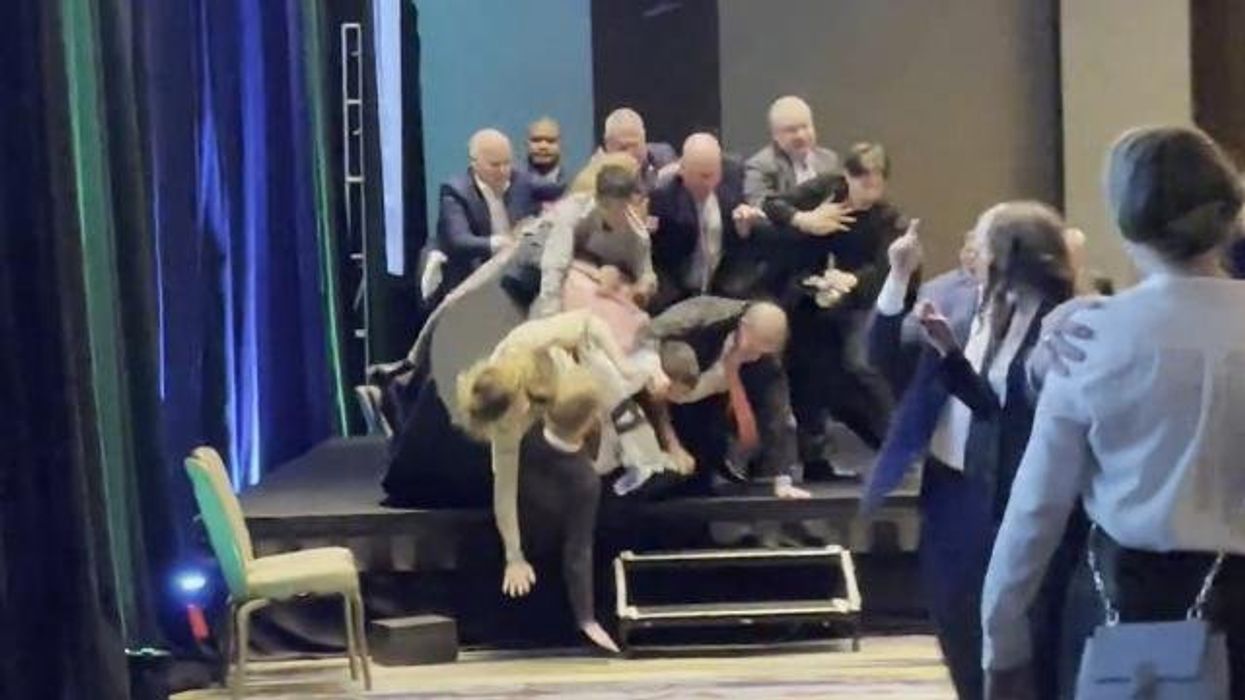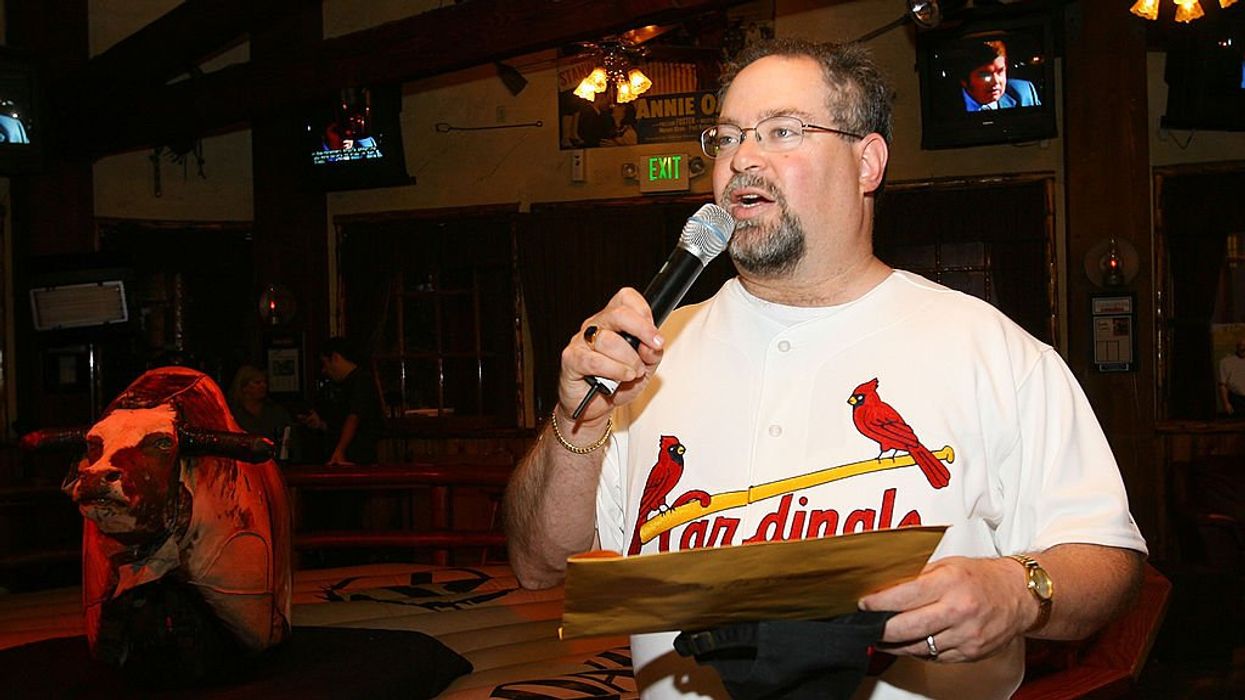
© 2024 Blaze Media LLC. All rights reserved.
Are Young Americans Waiting Too Long to Get Married? TheBlaze Explores This Phenomenon
April 04, 2013
Over the weekend, we documented Princeton University alum Susan Patton and the firestorm she ignited after writing an op-ed intended for female students at her alma mater. In it, she advised young women to find a husband while they are attending the school. Her controversial piece was published in The Daily Princetonian, a campus newspaper, and feminists quickly reacted with offense.
These critics were particularly irked by her recommendation that women make it a concerted goal to find a man while in college. While some might have qualms with what she said, Patton raises some interesting points.
To begin, in a world in which people are getting married later in life, one wonders what the impact of changes in matrimonial patterns mean for both individuals and society, alike. It's no secret that the average age of men and women choosing to walk down the aisle has increased. From personal, practical and sociological points, it's worth examining the phenomenon.
 Credit: Getty Images
Credit: Getty Images
"For most of you, the cornerstone of your future and happiness will be inextricably linked to the man you marry, and you will never again have this concentration of men who are worthy of you," Patton wrote. "Here’s what nobody is telling you: Find a husband on campus before you graduate. Yes, I went there."
Some feminists took issue with this commentary, as TheBlaze's S.E. Cupp highlighted in an MSNBC appearance earlier this week. But Cupp defended Patton, noting that the writer is getting critique mainly because many feminists believe that one shouldn't tell women at a "liberal university" about the value that getting married can have in their lives.
Here's how Mediaite recapped Cupp's defense of Patton:
Patton told CNN recently that she was urging women at Princeton to find a man who “isn’t threatened by your capacity for greatness.”“Yes, that sounds like someone who wants to keep women in big skirts and baking aprons,” Cupp opined.
“We are defined by our spouses,” Cupp said, noting that feminists try to ignore this inconvenient reality at their peril. She noted that finding a spouse who shares your background, values, and aptitude is something that people do naturally.
“The idea of marrying well or marrying up isn’t a conversation for polite, liberated circles,” Cupp continued. She identified a measure of hypocrisy in feminists who cheer a woman’s prerogative to marry another woman, chose not to marry, or to exercise their right to choose when to reproduce is all “fantastic and fabulous.” But to suggest that a woman should marry a good man is a “radical insult to womanhood.”
Watch the segment, below:
While there's plenty to debate about Patton's views (they can be read in their entirety here), the grander discussion about marriage and the appropriate age to wed is very clearly worth having. The writer's view is that college is a prime time for individuals to find their soul mates; the window to locate a match, in her view, is a relatively tiny one.
After all, higher education allows people to be surrounded by a pool of individuals who are the same age and who presumably have the same or a similar level of intellectual capacity. For those looking for a decent counterpart, it's the best environment with the highest chance of finding a match. These, of course, are the practical and more logical elements of the argument to consider.
Editor's note: The author of this post, Billy Hallowell, joined TheBlaze Editor-in-Chief Scott Baker on Thursday's BlazeCast to talk about this story:
But then there are those who would say that it is better off for young people to wait until later in life to marry. These skeptics would say that the world has changed and that it's essential for men and women, alike, to pause on definitive romance until they have fully developed their careers and lives.
Life's complications make it logistically difficult and the stresses have the potential to lead to divorce, these cynics might argue.
 Credit: AP
Credit: AP
These critics do have some data to back up their points. One 2012 study by IHS Global Insights found that student loan debt has been a major barrier and catalyst for pushing off marriages for young Americans. Bloomberg explains:
A new report...by economic forecasting firm IHS Global Insight points out that while other forms of debt have been going down since 2007, student loan debt has been growing, both in terms of the number of borrowers and the size of the loans. At the same time, the number of young Americans delaying marriage and starting a family has accelerated.
In 2007, the median age of a first marriage for males was 27.5 years old, and for females, 25.6 years old, according to IHS. By 2011 it crept up to 28.7 and 26.5, respectively. Fertility rates, defined as births per 1,000 women aged 15-44, decreased significantly from 69.3 in 2007 to just below 65 last year. (The marriage trend began earlier in the decade. Fertility rates, on the other hand, were going up until the recession hit.)
While credit-card, auto loan, and mortgage debt have all been falling since 2007, student loan debt has been rising—and faster than expected. Last week the Consumer Financial Protection Bureau announced that student loan debt surpassed the $1 trillion mark in the fourth quarter of 2011. That estimate is greater than earlier ones, including the New York Fed’s $867 billion projection.
The data seem to corroborate the notion that people are marrying later, while also providing some potential financial and logistical reasons why this may be occurring. And also consider what Slate's Julia Shaw had to say about marriage trends in a recent article (i.e. young people are increasingly waiting to wed):
Only 21 percent of millennials (those ages 18-29) are married, and the median age for marriage is the highest in generations: almost 27 for women and 29 for men. By comparison, 29 percent of Generation X, 42 percent of Boomers, and 54 percent of the Silent Generation (born 1928 through 1945) were married by that age, according to a 2010 Pew Research Survey.
According to Pew, 60 percent of unmarried men and women want to tie the knot. But they just aren’t in any hurry. Marriage these days signals that you’ve figured out how to be a grown up. You’ve played the field, backpacked Europe, and held a bartending gig to supplement an unpaid internship. You’ve "arrived," having finished school, settled into a career path, bought a condo, figured out who you are, and found your soul mate. The fairytale wedding is your gateway into adult life. But in my experience, this idea about marriage as the end of the road is pretty misguided and means couples are missing out on a lot of the fun.
It is true that the economy has created a tough situation for young people -- one that requires individuals to work a bit harder to reach success. But it also seems as though those in their twenties (i.e. Millennials) are, many times, stunted in their growth or simply not in the same mental and professional standing as were those in the generations before them.
Supporters of marrying young would likely argue that these individuals are waiting too long, while failing to recognize the benefits of wedding at an earlier age. After all, marriage brings with it responsibility and the requirement that those who seriously enter into it step up to the plate and meet various requirements.
 Credit: AP
Credit: AP
It's certainly haphazard to marry too young, especially when a couple doesn't yet know or fully trust one another enough, but has society moved too far away from solidifying marriages early on?
Shaw states in her article that she once had a timeline for how marriage should work -- one that reserved her 20s for education; marriage simply wasn't a priority. But she has now realized that getting married young and well before she and her husband were solidified in careers and life has actually been a blessing.
"Sometimes people delay marriage because they are searching for the perfect soul mate. But that view has it backward," she writes. "Your spouse becomes your soul mate after you’ve made those vows to each other in front of God and the people who matter to you. You don’t marry someone because he’s your soul mate; he becomes your soul mate because you married him."
And Daily Beast writer Megan McArdle shared this perspective, noting that while she disagrees with Patton's choice of words and publication (especially considering that one of her sons still goes to Princeton), she does agree with the sentiment. She writes:
...While I wouldn’t have said it exactly the way she chose, I think Susan Patton is basically right: people should be looking to get married as early as possible.I say this as someone who married late, and since I wouldn't want to have married anyone except my husband, I'm glad I waited. But as a general rule, you should err on the side of marrying early. By which I mean not that you should marry whoever happens to be around when you turn 22, but that you should be willing to recognize, at the age of 22, that you've found someone you want to marry. Right now, most Princeton students don't think that way. They think there's something weird about committing at 22. And if they try to commit, their friends and parents will warn them off.
McArdle notes that, while there are drawbacks, it's much less scary to consider marriage during college. Plus, the pool is larger than one will encounter later in life. Read the rest of her fascinating post here.
What do you think -- are people waiting too long to get married? Take the poll, below and let us know.
Want to leave a tip?
We answer to you. Help keep our content free of advertisers and big tech censorship by leaving a tip today.
Want to join the conversation?
Already a subscriber?
Billy Hallowell
Billy Hallowell is the director of communications and content for PureFlix.com, whose mission is to create God-honoring entertainment that strengthens the faith and values of individuals and families. He's a former senior editor at Faithwire.com and the former faith and culture editor at TheBlaze. He has contributed to FoxNews.com, The Washington Post, Human Events, The Daily Caller, Mediaite, and The Huffington Post, among other outlets. Visit his website (billyhallowell.com) for more of his work.
more stories
Sign up for the Blaze newsletter
By signing up, you agree to our Privacy Policy and Terms of Use, and agree to receive content that may sometimes include advertisements. You may opt out at any time.
© 2024 Blaze Media LLC. All rights reserved.
Get the stories that matter most delivered directly to your inbox.
By signing up, you agree to our Privacy Policy and Terms of Use, and agree to receive content that may sometimes include advertisements. You may opt out at any time.


